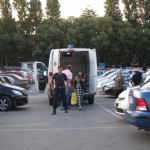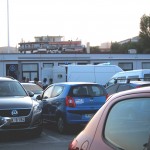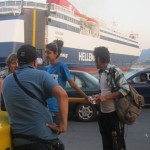Wednesday, 6th August 2014, first day at the harbour of Mitilini:
When I started telling the people my own story, that I came here via Greece and have been very long here and than made it out – it changed our relation immediately. I had all the memories from the past – it was exactly this harbour and it was exactly this place of my arrival. But the difference was: when I arrived here, nobody was there to explain anything to me or to say welcome.
We are now here in Mitilini on our second journey back to the border. In a group of activists from various countries – with many of us having arrived in Europe via the Greek islands – we decided to go daily to the harbour to meet with people who were released from the refugee-prison in Moria and sought to leave for Athens. On the first day we met 24 people, all of them Afghan refugees. After their arrival on the island by boat they were imprisoned in Moria. From there they were transferred directly by a police-van to the harbour. Most of them had been imprisoned for about one and a half weeks – and all of them were quite happy to be able to continue their trip. These days there are daily releases from the prison as there are daily arrivals too and people try to continue their trip with the ferries going to Athens. Upon release they receive a white paper (deportation order) that says that they have to leave the country within 30-days. When the 30 days are over they become undocumented again and fear imprisonment again only for this reason up to 18 months and more.
During our meetings in the port we did two video interviews with people who told us how bad the situation in the prison Moria was. They complained about insufficient food (only biscuits at morning, for lunch old noodles that made people sick) and especially about hygiene problems. They said that showers and toilets were not working properly; when they used them water spilled into the rooms. They told us that police forces ill-treated them and insulted them in a racistic way. The food was given to them by throwing it in front of their feet as if they were dogs. Also, they felt that the way in which they were transported to the harbour was not how human beings should be treated.
In the beginning I was very happy when I was standing there waving and then I started to worry about their future. Whom will they meet to assist them in the many difficulties awaiting them in Athens and on their further way. I started to be sad in the same moment, so many questions and so many problems in front of them until they will reach their destination.
The many question that they had could only be addressed shortly due to time pressure: what is the best way out of Greece? What happens if I am fingerprinted in other European countries on the way to my final destination? Is Norway still the best place for Afghan refugees? Underaged refugees had heard about examinations by doctors to change their age into being adults and they were afraid of that.
They asked many questions about the situation in different European countries and we told them about our own experiences. Some knew quite clear were they wanted to go, but they had not enough information. With some who wanted to go to Germany we exchanged contacts and we will keep in touch to welcome them and assist them there if they have more questions or concrete needs.
We also explained what to do to apply for asylum in Greece and other things they wanted to know about Greece. Many of those we had met here during our last trip in October in 2013 were again imprisoned in one of the mass pre-removal detention centres on the mainland like Xanthi or Komotini. Only a few of them were released up to know due to entering the asylum system or being finally recognized as unaccompanied minors. Many remain detained and will stay 18 months or more.
I speak Greek and so I also helped people for example to buy their tickets. It is a lot of stress for the people that they have maybe enough Dollars but no Euros in their pocket, they don’t know how to change it and where to stay. It is very important for them to continue their trip all together and not to leave family members or friends behind.
It is one of our most important tasks that people go to the port every day.
Before the ship left we took some farewell-photos and then we stood there in the harbour and waved. We became somehow attached to these people in a very short time. What gave the people confidence was that we ourselves had been going through this hardship and came back to help others. And some of them said: when I make it myself I will come back like you to welcome the next newcomers!
We will need some support from all of you to cover some of the costs, so we put below our bank-account details for donations:



